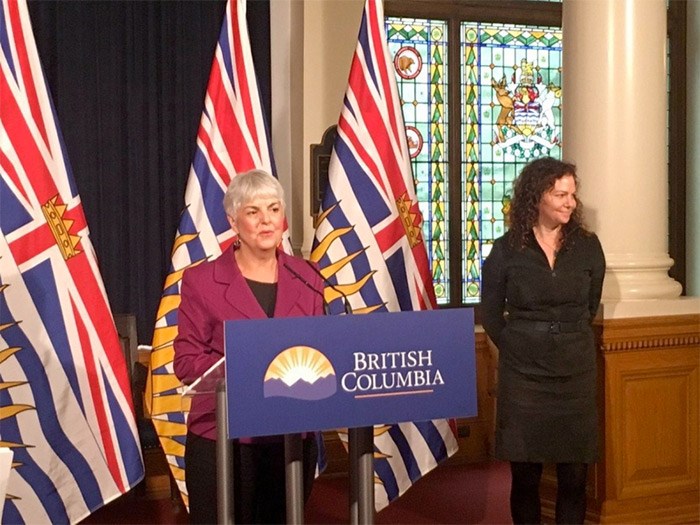 Finance Minister Carole James explains province’s agreement with Airbnb during a press conference at the legislature on Wednesday. Photograph By TIMES COLONIST
Finance Minister Carole James explains province’s agreement with Airbnb during a press conference at the legislature on Wednesday. Photograph By TIMES COLONIST
The B.C. government will allow Airbnb to collect provincial sales taxes on short-term rentals, which Finance Minister Carole James said will help fund affordable housing.
Once legislation is put into place, Airbnb will be able to collect eight per cent provincial sales tax and up to three per cent in municipal hotel tax.
“This initiative will provide additional revenues to address housing affordability and it improves tax fairness for all British Columbians,” James said at a joint press conference with Airbnb.
The province estimates Airbnb will remit $16 million through the PST and $5 million through the municipal tax.
James did not make any announcements on affordable house but said the government's comprehensive affordable housing strategy will be announced later this month when the budget is released.
Airbnb will collect the tax on behalf of short-term rental hosts.
Cities such as Victoria and Â鶹´«Ă˝Ół»have put in rules restricting short-term vacation rentals amid concerns that they are squeezing out renters and creating a near-zero vacancy rate.
Airbnb was originally launched with the idea that home owners would rent out a room in their home but some investors have used condos as full-time vacation rentals, which removes that unit from the supply of long-term rentals.
The City of Victoria estimates there are 1,500 short-term vacation rental listings concentrated around downtown, with some managed by commercial operators.
In September, the city enacted zoning changes covering much of downtown that removed an option to legally offer rentals of less than 30 days.
The zoning change means condo units being operated as short-term rentals through platforms such as Airbnb will be grandfathered in, but lose that status if they are not operated as a short-term rental for a six-month period. Short-term rentals will be banned from downtown developments now under construction.
City staff have proposed a business licensing fee of up to $2,500 a year for a property being used for short-term rental.
In October, the Canada Mortgage and Housing Corporation, the company that’s mandated to help house Canadians, announced it was looking to Airbnb and other short-term rental companies like Vacation Rentals By Owners (VRBO) to help “spawn supply” of rental housing in the country.
The corporation’s CEO Evan Siddall told the Canadian Press that he was in talks with Airbnb about potentially turning their large supply of short-term rentals into longer term rental homes. However, he said it was too soon to determine the details of how the platform could help with affordable housing.
Affordable housing was a key pillar of last year’s election campaign, with the NDP promising to cool B.C.’s hot real estate market by cracking down on speculators and increasing the stock of affordable housing.
On the campaign trail, Premier John Horgan vowed to give renters a $400 rebate for renters but that was absent from last fall’s budget.
After the budget was released, Finance Minister Carole James said “the renters’ rebate will come” and said the NDP and Green parties were working on a comprehensive strategy on housing.
The budget did include $208 million to build 1,700 units of affordable rental units over four years, along with plans for 2,000 units of new housing for homeless people.


